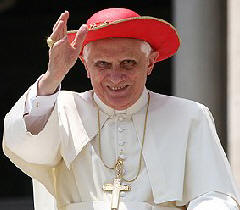|
Pope Benedict XVI- Angelus |
 Angelus Message
Angelus Message
On Viterbo, The "City of Popes"
"Confirm Your Brothers"
H.H. Benedict XVI
September 6, 2009
www.zenit.org
Dear
Brothers and Sisters!
At the end of this solemn Eucharistic Celebration, I once again
thank the Lord for having giving me the joy to pay this pastoral
visit to your diocesan community. I have come among you to encourage
you and confirm you in fidelity to Christ, as the theme that you
have chosen indicates: "Confirm your brothers" (Luke 22:31). These
words of Jesus were directed to the Apostle Peter during the Last
Supper, entrusting to him the task of being the pastor of his entire
Church here on earth.
For many centuries your diocese has distinguished itself by a
singular bond of affection and communion with the Successor of
Peter. I was able to experience this visiting the Palazzo dei Papi
(Palace of Popes) and, in particular, the hall of the "Conclave."
St. Leo the Great, who performed a great service to truth in charity
through an assiduous exercise of the word, as his sermons and
letters bear witness, was born in the vast territory of ancient
Tuscia. Pope Sabinian, successor of Gregory the Great, was born in
Blera; Paul III was born in Canino. Viterbo was chosen for the whole
second half of the 12th century as the residence of the Roman
Pontiffs: Five of my predecessors were elected here, and four of
them are interred here; more than 50 have visited -- the last was
the Servant of God John Paul II, 25 years ago. These figures have a
historical significance, but I would like to stress their spiritual
value above all at this moment. Viterbo has been justly named "City
of Popes," and for you this constitutes a further stimulus to live
and witness to the Christian faith, the same faith that the holy
martyrs Valentino and Ilario -- who rest in the cathedral -- gave
their lives for. They are the first of a long line of saints,
martyrs and blesseds from your land.
"Confirm your brothers:" Today I felt this invitation of the Lord
addressed to me with a singular intensity. Pray, dear Brothers and
Sisters, that I might be able to carry out the mission of the
pastors of the entire flock of Christ with ever greater fidelity and
love (cf. John 21:15 ff.). For my part I assure you of a constant
remembrance in the Lord for your diocesan community, so that its
different articulations -- whose symbolic representation I was able
to admire in the cathedral's new bronze doors -- will tend more and
more to a complete unity and fraternal communion, indispensable
conditions for offering the world an efficacious evangelical
testimony. I will entrust these intentions this afternoon to the
Virgin Mary in my visit to the shrine of the Madonna della Quercia
(the Madonna of the Oak). Now, with the prayer that recalls her
"yes" to the angel's announcement, let us ask her always to keep our
faith strong and joyful.
[After the Angelus, the Holy Father said in Italian:]
I would now like to address a cordial greeting to the participants
in the International Congress "Men and Religions," which is
convening in Krakow on the theme: "Faiths and Cultures in Dialogue."
Numerous figures and representatives of the various religions --
invited by the Archdiocese of Krakow and the Community of
Sant'Egidio -- are gathered to reflect and pray for peace, 70 years
after the outbreak of World War II. We cannot fail to recall the
dramatic events that brought on one of the most terrible conflicts
in history, that caused tens of millions of deaths and provoked so
much suffering among the beloved Polish people; a conflict that saw
the tragedy of the Holocaust and the extermination of many other
innocent people. May the memory of these events move us to pray for
the victims and for those who still carry wounds in their bodies and
hearts; may it also be an admonishment to all not to repeat such
barbarities and to intensify the efforts to create in our time,
marked by conflicts and oppositions, an enduring peace, transmitting
above all to the new generations, a culture and a lifestyle shaped
by love, solidarity and esteem for the other. In this perspective,
what is especially important is the contributions that religions can
and must make in promoting forgiveness and reconciliation against
violence, racism, totalitarianism and the extremism that disfigure
the image of the Creator in man, erase God from the horizon and,
consequently, lead to the scorn of man himself. May the Lord help
you to build peace beginning from love and from mutual understanding
(cf. "Caritas in Veritate," no. 72).
[Translation by Joseph G. Trabbic]
Look
at the One they Pierced!
This page is the work of the Servants of the Pierced Hearts of Jesus and
Mary